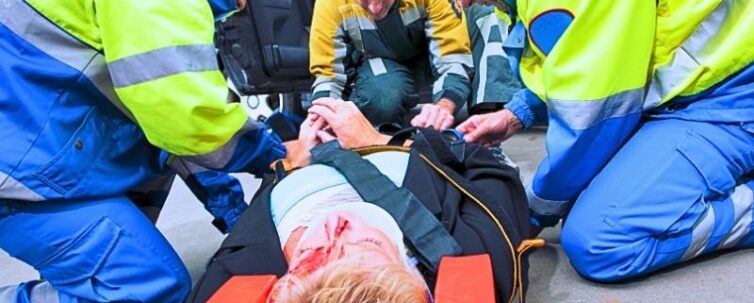The effects of a car crash on the human body can range from whiplash to fractures, sprains, and more serious conditions. The physical forces released during an accident can result in many types of injuries to drivers and passengers, causing significant damage to the human body. If you have been injured, regardless of the severity, a personal injury attorney can provide legal assistance to help you pursue the compensation you need to recover from the accident.

Table of Contents
Car Crash Statistics in Illinois
In the first three months of 2022, there were around 9,560 fatalities in car accidents across the United States. That is a 7% increase compared to the same period in 2021.
Since 2019, there has been a rise in crash-related fatalities in Illinois. In that year alone, there were 1,010 fatalities resulting from 938 crashes. Of those crashes, 315 fatalities involved individuals wearing seatbelts, 263 fatalities were due to lack of restraint, and 186 drivers were unlicensed.
The number of fatalities peaked in 2021, with 1,334 fatalities resulting from 1,210 crashes. Among those crashes, 308 drivers were wearing seatbelts, while 337 weren’t wearing theirs properly, and 283 fatal crashes involved unlicensed drivers.
2021 saw more pedestrian fatalities than in the previous five years, with 214 deaths. The number of pedestrian deaths in 2020 was 175, 170 in 2019, and 165 in 2018.
Furthermore, there were more semi-truck crash fatalities in 2022 compared to previous years. Specifically, there were 128 fatalities involving semis in 2021, 122 in 2020, 116 in 2019, and 126 in 2018.
In 2021, motorcycle crash deaths also peaked with 167 fatalities. 148 deaths were caused by motorcycles in 2020, 137 in 2019, and 118 in 2018.
Between 2018 and 2020, the leading causes of fatal crashes were speeding (39%), drunk driving (27%), and distracted driving (12%).
Common Types of Car Crash Injuries
When a collision occurs, drivers, passengers, and pedestrians may sustain a variety of injuries. These injuries are broadly categorized into two groups.:
- Impact injuries happen when a passenger collides with any part of the car’s interior or is thrown out of the car and hits the ground or other objects. For instance, if a driver suffers a head injury when his or her head hits the side window, it is an example of an impact injury.
- Penetrating injuries occur when loose objects inside the vehicle hit the passenger. For example, a collision victim may be cut by shattered glass from a broken window.
Accurate diagnosis by medical professionals is crucial for documenting injuries in pursuit of compensation for crash damages.
There are various types of injuries that may be suffered in a car accident:
Head and Back Injuries
Head and back injuries can be some of the most severe and challenging ones to recover from. These types of injuries include traumatic brain injuries (TBI), concussions, spinal cord injuries, neck and chest injuries, broken or bruised ribs, and whiplash. It’s essential to seek immediate medical attention if you experience any of these injuries.
TBI occurs when the brain is jolted, often during a car accident. This injury can range from mild to severe, and prompt treatment is essential to recovery. A concussion is a specific type of TBI that requires medical attention, even if it’s considered mild.
Spinal cord injuries can cause complete or incomplete paralysis and should be taken seriously. It’s not always immediately apparent if you have a spinal cord injury, so if you suspect any damage to your spine, let medical staff know immediately or go to the hospital.
Injuries to the neck and chest are also common in car accidents. The momentum of being thrown forward can cause bruising and other injuries from the seatbelt or impact with the steering wheel. Chest injuries can be severe, and even fatal. Broken or bruised ribs are frequently injured in car accidents and can cause additional complications.
Whiplash is a common injury that occurs when the neck snaps backward or forward. Although most people recover within a few weeks, some people may take months or longer to recover. It can also be caused by a faulty airbag deployment.
Soft Tissue Injuries
Sprains and strains. A sprain happens when there is an injury to the ligament between two bones of a joint, such as the knee or elbow. On the other hand, a strain is an injury to the muscle or tendon connecting muscle to bone. Although sprains and strains are typically less severe than other injuries, they should not be overlooked or taken lightly.
Bruising is another common injury after a car accident. While most bruises will heal on their own, severe bruises can be dangerous to your health. For example, severe chest injuries can bruise your heart and cause long-term damage.
Arm and Leg Injuries
Broken bones can be caused by motor vehicle accidents, resulting in limb fractures. While some broken bones are easily visible, others may not be immediately apparent. You may not realize that you have a broken bone until after the accident. Seeking prompt medical attention is crucial for the best outcomes.
Loss of limbs is another severe injury that can occur. This can happen either due to trauma at the scene or complications afterward. If you have lost a limb in an accident, it is a significant injury that requires urgent medical attention. Inform the medical or law enforcement staff on the spot about your injury as soon as possible.
Other Car Accident Injuries
Penetrating injuries occur when a foreign object pierces the body. These types of injuries can happen during car accidents when loose objects are thrown around during impact or when parts of the car itself penetrate the body. If you have been punctured by a foreign object, it is important not to remove it unless directed to do so by a medical professional. On-scene evaluation may not always be possible, so you may need to be transported to the hospital for further evaluation.
Organ damage can occur as a result of a puncture wound or blunt force trauma. The spleen, liver, and small intestine are the organs that are most commonly affected, although any organ can be damaged. Internal bleeding can be caused by organ damage, which may result in blood clots several days or weeks after the accident.
Post-traumatic stress disorder (PTSD) can result from experiencing a traumatic event like a car accident and can have long-lasting effects on your emotional health. PTSD is characterized by strong adverse reactions to triggers that remind the victim of the accident. This is a serious health issue that may require medical attention, as it can impact anyone at any time.
PTSD can be challenging to diagnose due to the lack of physical symptoms, and it may surface long after the initial incident. PTSD is not a sign of weakness or inability to cope. If you are experiencing any symptoms of PTSD, it is strongly advised to seek help as soon as possible.
Immediate Effects of Car Crash Injuries
The speed of the drivers prior to the accident and the position of the victim upon impact are among the factors that determine how quickly physical issues will manifest following a car accident. Whiplash, which causes micro-tears in surrounding ligaments, is one of the most common injuries sustained by car accident victims.
Some common short-term effects of whiplash and other soft tissue injuries include:
- Headaches that can range from mild to extreme migraines.
- Blurred vision or other visual disturbances.
- Feeling dizzy.
- Tinnitus.
- Limitations in the range of motion in the neck or shoulder regions.
- Pain or stiffness in the neck, low or mid-back, arm or shoulder.
After a car accident, it is common for victims to experience swelling due to tissue damage, sprains, pulled muscles, and other injuries.
Long-Term Impacts of Car Crash Injuries on Victims
Car accident injuries may have delayed onset or be initially hidden. You may not realize the full implications of the accident. These may include cognitive impairments or impact on your ability to carry out daily activities.
Cognitive Impairments
In a car accident, your head may collide with the steering wheel, dashboard, or window, causing your brain to move inside the skull. This sudden movement can result in a concussion, contusion, or traumatic brain injury (TBI).
Those who suffer head injuries, such as concussions or other TBIs, often experience cognitive impairments. This can lead to difficulties with concentration, attention, perception, planning, communication, writing skills, judgment, sequencing, or reading, as well as memory loss, whether short-term or long-term. They may also encounter the inability to regulate their emotions, leading to abrupt personality changes. These consequences can have psychological effects, such as depression and social isolation.
Moreover, cognitive impairment is likely to affect your work performance. It may cause you to lose hours at work, or even to lose your ability to perform at your previous level of productivity.
Impact on Daily Activities and Quality of Life
Car accident injuries can have a significant impact on every aspect of your life, particularly your quality of life. Severe injuries may even make it impossible to perform simple tasks such as walking, exercising, or working at your desk. They can also take away the joy of spending time with your family, kids, grandkids, or friends, and limit your ability to participate in activities you used to enjoy, such as hiking or skiing. This can result in losing touch with friends or missing out on valuable time with family. As a result, you may feel emotionally affected, leading to depression, loss of family or friends, and the inability to enjoy the activities you once loved.
Legal and Financial Implications for Victims of Car Crash Accidents in Illinois
Car accidents can lead to significant financial difficulties for victims and their families. For instance, the insurance company may not cover the costs of certain medical expenses, or it may be difficult to know what the car insurance claims process is. This can cause a major financial burden.
Additionally, if you are unable to return to work due to the injuries sustained in the accident, the lost wages can make it challenging to make ends meet. Pursuing a claim for compensation may also involve legal implications, such as hiring a car accident attorney to build your case, negotiate, or file a lawsuit.
Medical Expenses and Ongoing Treatments
Medical expenses can quickly pile up after a car accident. Aside from immediate costs like emergency room visits, surgery, and medication, there may also be a need for follow-up visits, physical therapy, or specialized treatment that can last for weeks, months, or even years.
Physical injuries can require ongoing treatment and rehabilitation. Traumatic brain injuries or spinal cord injuries may require years of therapy and medical assistance. Additionally, chronic pain conditions can develop, requiring continual pain management.
Medical expenses can also include the cost of medical devices, at-home care, and ongoing prescriptions. Some people may even need psychological therapy to deal with the trauma of the accident.
Your attorney may be instrumental in determining these long-term costs when thinking about settlements. You should follow the correct tips for hiring a lawyer after a car accident, to ensure that you have one who can calculate your damages correctly.
Loss of Income and Career Limitations
Car accidents can have severe financial consequences, including affecting your ability to work. You may have to take time off for recovery and treatment, which can result in an immediate loss of income. However, the impact can be long-lasting. Physical injuries and psychological trauma can limit your ability to perform your job, which may result in reduced earning capacity. Sometimes, victims may have to switch to lower-paying jobs or reduce their working hours, which can have long-term implications for their financial stability. Therefore, it’s crucial to consider both present and future income loss and career limitations when addressing accident settlements.





